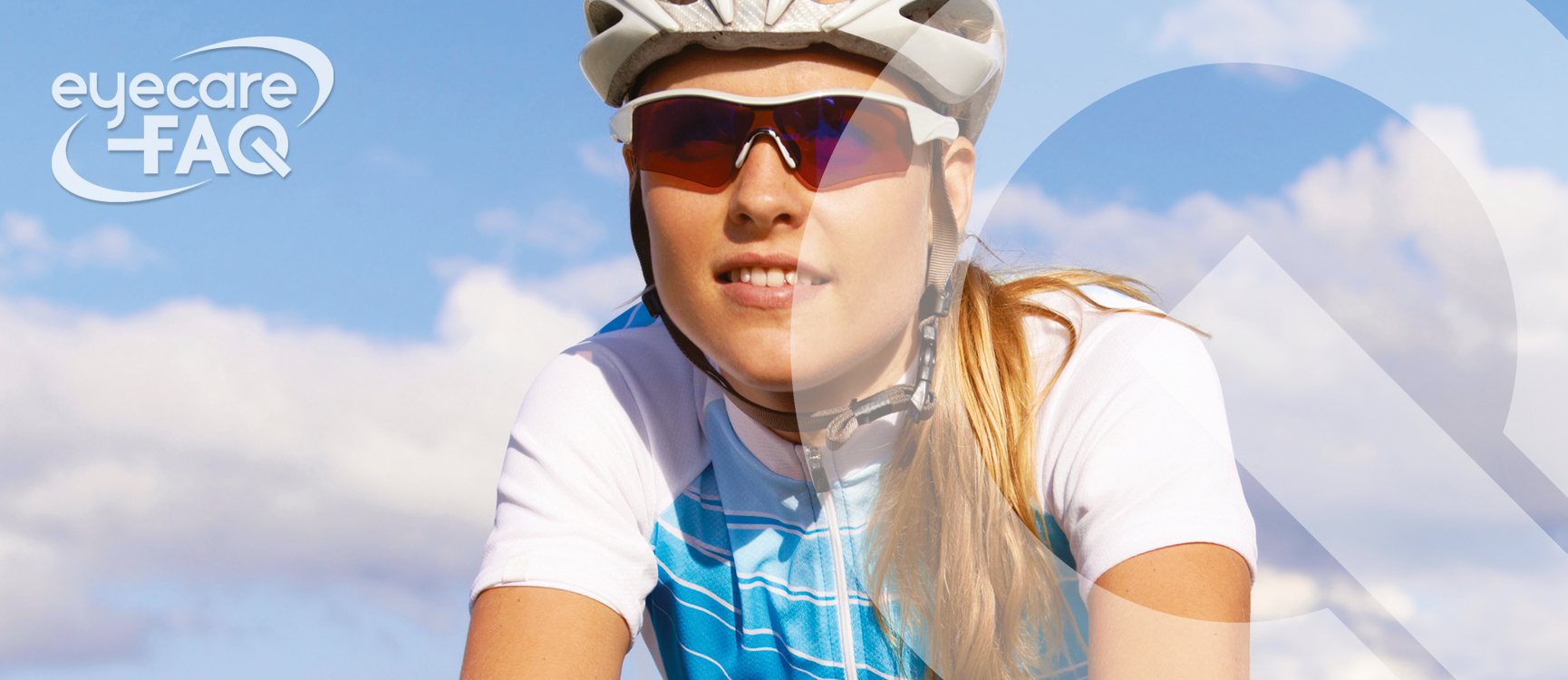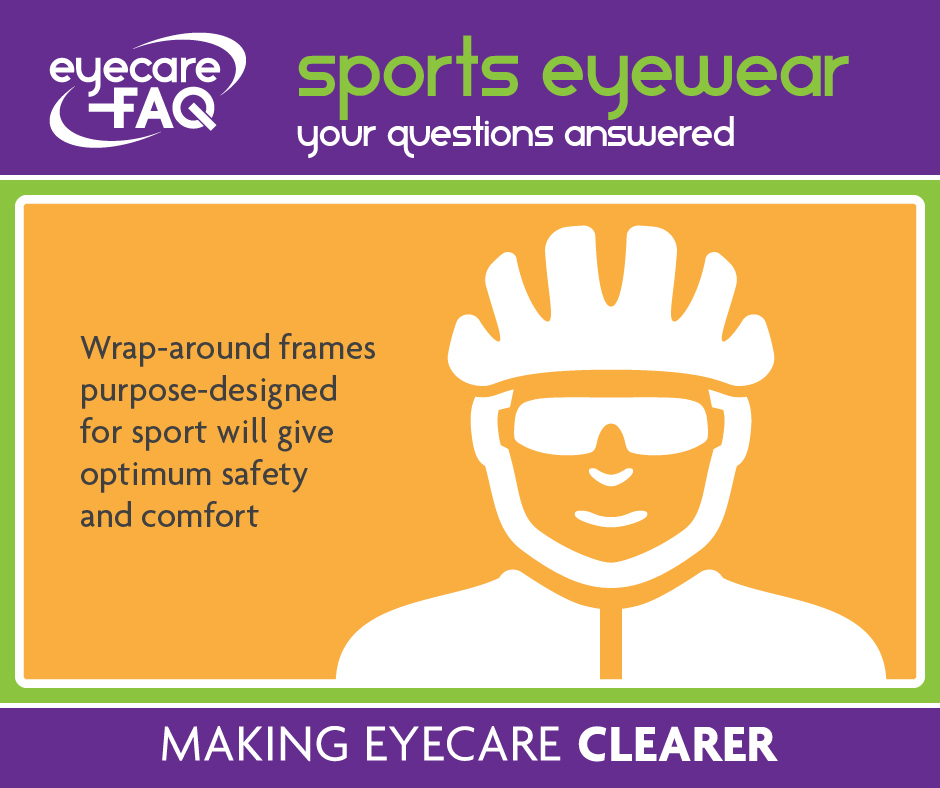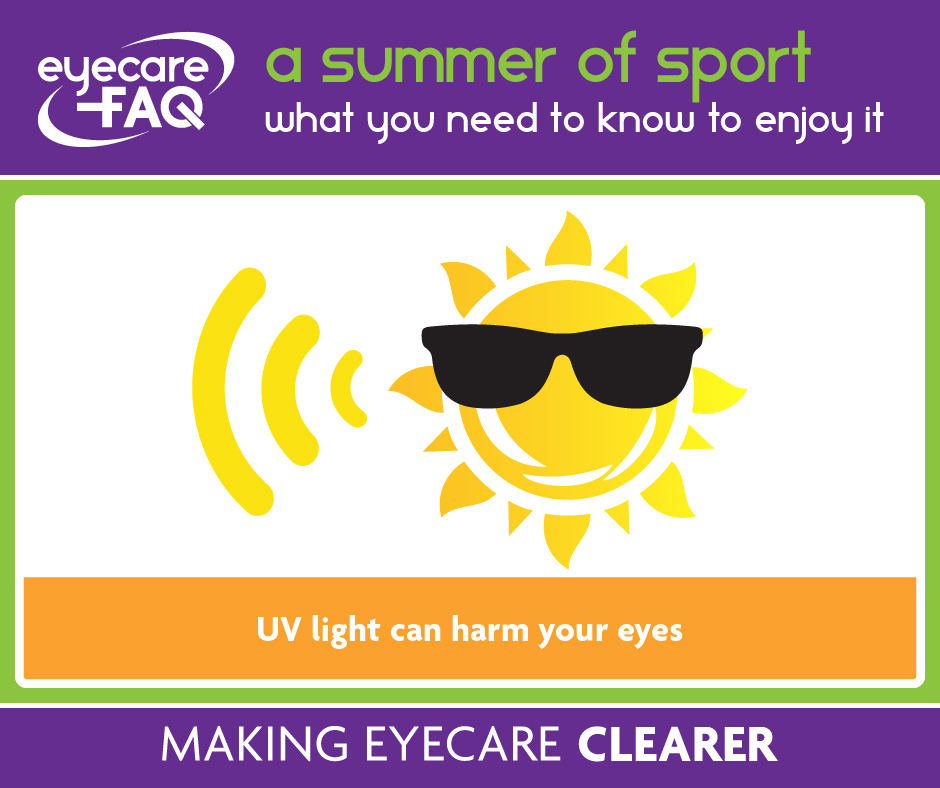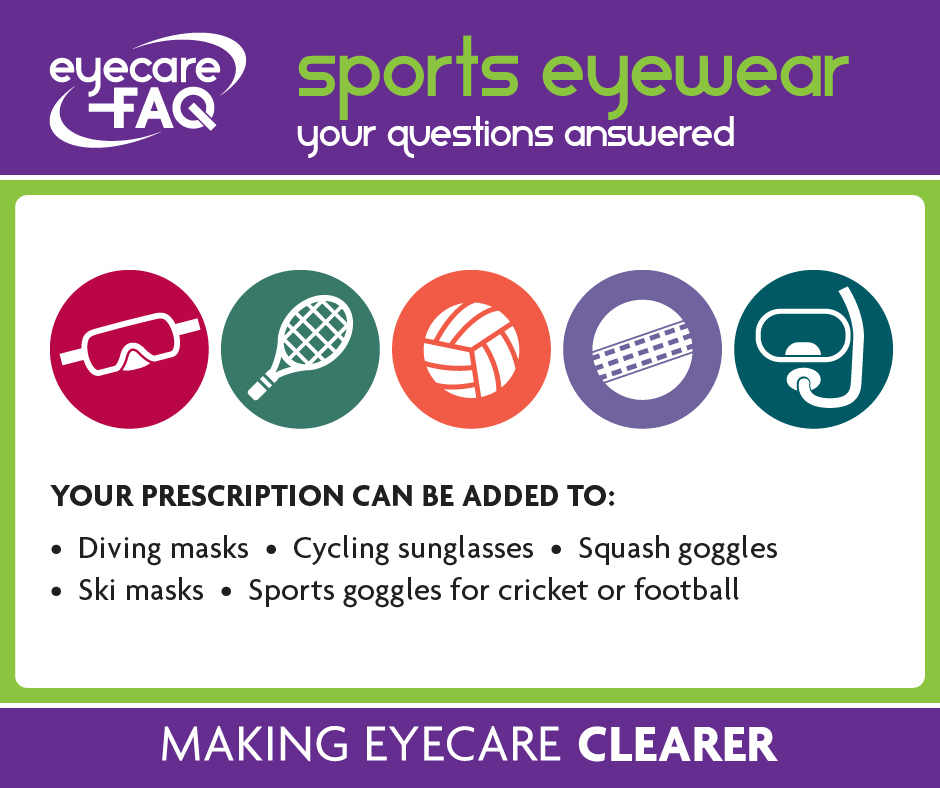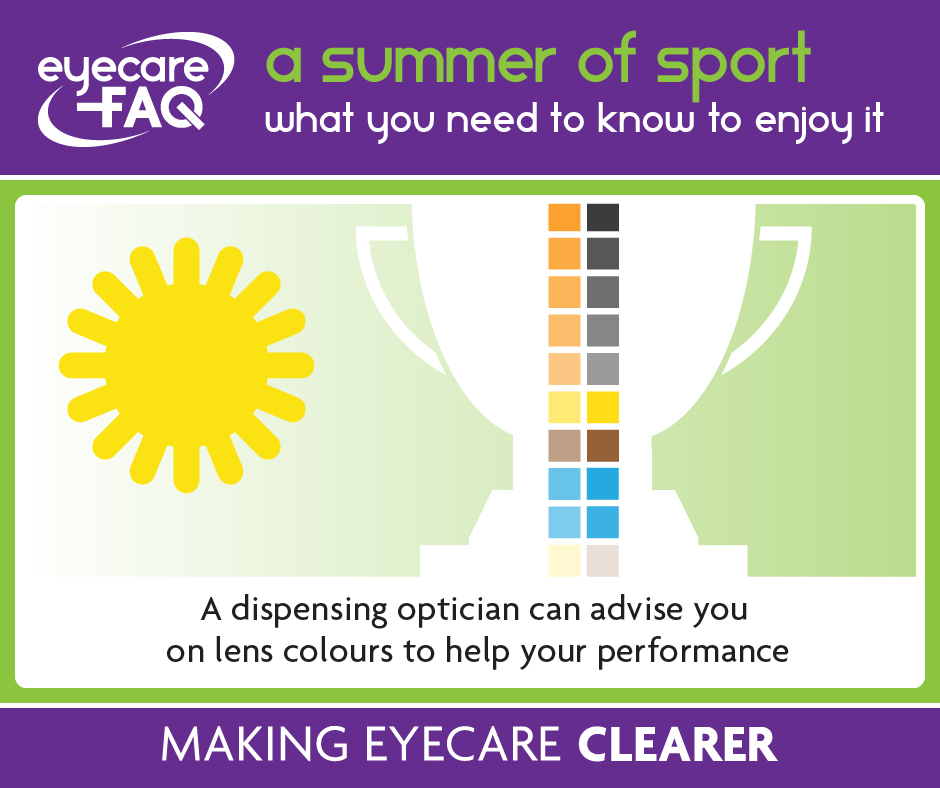What is the best eyewear for sports?
If you wear glasses, they can be hazardous when playing sport. Get the right product and advice from your optician, however, and they can help protect your eyes. In general, plastic or CR39, lenses are safer than glass. Your optician may also recommend polycarbonate or Trivex materials as they are safer and stronger than regular plastic lenses.
Some conventional spectacle frames can be suitable for non contact sports however most metal frames with their adjustable nose pads are not suitable. A frame used for sports should cover the orbit, the bony rim round your eye, and be worn with a sports band attachment. The Bridge of the frame should sit snugly around the bridge of the nose. There are wrap-around frames with full cushioning which are purpose-designed for sport and will give optimum safety and comfort.
If there are no contra indications, contact lenses are an excellent alternative to wearing spectacles and offer a safe alternative to glasses when you are playing sports.
Visit your local optical practice and speak to the registered dispensing optician who can help you find the best solution so you can see well and stay safe while playing sports.
I need glasses, but love to swim. Can I get prescription swimming goggles?
Poor vision and the salt or chlorine in water can make swimming an uncomfortable experience. If you normally wear spectacles or contact lenses, you will find that prescription goggles can help you. Ready-to-wear prescription goggles, incorporating basic lens powers are available, or your dispensing optician can order more bespoke goggles with your accurate prescription incorporated.
Call in to your local optical practice and ask the registered dispensing optician for more advice on the best goggles to help you make the most of swimming.
I wear glasses. What eyewear can help me see when diving?
It is important to protect your eyes whether you are scuba diving or snorkelling. You should wear a watertight facemask which fits firmly.
If you are a spectacle wearer, your optician can order in masks that will also help you see under water. Some masks come with inserts for prescription lenses, while others allow the prescription lens to be bonded to the rear surface of the mask, accurately centred for your eyes.
Call in to your local optical practice and ask the registered dispensing optician for more advice on the right masks with prescription lenses for diving.
Why do I need to protect my eyes when I’m playing sports outdoors?
When you are outside you are exposed to UV (Ultraviolet) rays from sunlight. There are three types: UVA, UVB and UVC. UVC is absorbed by the ozone layer and does not reach the earth, but the other types of UV light are linked to possible cataract formation, skin cancer and/or retinal damage with long term exposure. A good pair of protective eyewear can cut those risks so you can enjoy the sports you love without worrying about your eyes. Also impact from sports equipment and other participants can also cause injury along with foreign bodies such as dust and mud from a sports pitch. Eyes may benefit from protection from pollen for example in the summer and a registered dispensing optician can advise what type of eyewear would be most appropriate.
What’s the best eyewear for sailing?
It is important to protect your eyes when sailing because not only are you outside and exposed to UV light, but the water also reflects the sun’s rays and causes uncomfortable glare. Polarised lenses which are the only truly anti-glare lenses are great for use on and around water. A mirror coating on polarised lenses will counteract the increased UV being reflected from the water if you are out all day. Ask your registered dispensing optician about lenses for daytime use which combine photochromic technology with polarisation. They can also advise on non-slip frames and straps that ensure that you don’t lose your sunglasses even if you capsize.
What’s the best eyewear for tennis?
There are two hazards to your eyes when playing tennis: UV light, and the risk of being hit in the face by a ball, or even a racket when playing doubles. A good pair of sports goggles or special sports sunglasses can help cut both those risks and can also improve your performance on days when glare is an issue. Ask your registered dispensing optician for advice on robust lenses and frames for protection: polycarbonate lenses are a good option. The material can eliminate 100% of UV light and is stronger than regular plastic lenses. You can also discuss the different colour lens tints available, as some may work best for grass while others can be good for hard courts.
What’s the best eyewear for cycling?
More people are enjoying cycle sports, and it is important to think about eye protection while taking part. The right robust eyewear can protect you from wind, dust and impact injuries.
In cycling you need to combine protection from physical hazards, such as stones bouncing up off the road, with protection from exposure to UV light when you are outdoors for a prolonged period of time. Cycling eyewear also tends to be streamlined and aerodynamic. Ask your registered dispensing optician for advice on robust lenses and frames for protection: polycarbonate lenses are a good option. The material can eliminate nearly 100% of UV light and is stronger than regular plastic lenses. You can also discuss the different colour lens tints available. Different tints work well for different weather conditions. Photochromic lenses which become darker in bright conditions can save you from having to take sunglasses with you and change over in the middle of a race. The Dispensing Optician can also help you find a close-fitting frame that won’t fall off and will fit within your cycling helmet.
Why do I need to protect my eyes when running?
If you run on a regular basis, particularly with long distance training, you will be increasing exposure to UV & Blue light. Research shows an association between sunlight exposure and macular degeneration so UV protection is essential, especially when spending a vast amount of time outdoors. Gill Bickle is an active runner as well as being a Registered Dispensing Optician. She says, “I always advise runners to choose eyewear with UV protection. Choose a frame that’s lightweight, wrap around, which fits firmly and doesn’t move when you run. Contact lenses with built in UV blockers can also help.
What is the best eye protection for squash and other and racket sports?
Squash is a particularly hazardous sport as the squash ball is almost equal in size to the eye’s orbit. All squash players should wear eye protection. There are specifically designed goggles for squash use which must be fitted with the most efficient impact resistant lenses. These can be made up with lenses to match your spectacle prescription.
For all racket sports, as well as sports like cricket, rounders or baseball that are played with a hard ball, impact resistance is the prime concern. Plastic, CR39, lenses may be used, but polycarbonate or Trivex are preferable.
Talk to the dispensing optician in your local optical practice. They will be able to guide you through the best options to protect your eyes and give you great vision.
What are the best lens tints for shooting or archery?
A bronze tint should be used for skeet, clay-pigeon and trap shooting. It is also the tint of choice for hunting. For black on white target shooting yellow tints offer good contrast. Targets may vary in colour. For orange targets use an orange tint. Red and pink tints are good for black and green targets and are also effective on orange targets; they also reduce the effects of a green background, grass, trees and shrubs. A red tint can sometimes improve colour differentiation for people with a colour vision problem. Tints should not be too dark, as this results in an enlarged pupil, which can adversely affect the shooters’/archers’ performance.
What should I wear to protect my eyes when playing football?
Flying footballs and close physical contact make football a moderate risk sport for eye injuries. Spectacles or goggles may provide protection from injury and can also be worn with those who need to wear prescription lenses.
Polycarbonate Lenses: This is the most important property of all protective spectacles or goggles. Good polycarbonate is virtually unbreakable and will sustain the impact of a ball or finger.
Sports Band: an elasticised band and not temple pieces should secure the frame. Players must have something that will be secured tight to the head so that the spectacles or goggles won’t fall off. A frame with temples will not hold tight enough and a jab from a finger could lift the frame off and potentially damage the eye.
Although sports eyewear is intended to offer the best protection available, there is always the possibility that the wearer may sustain an eye or facial injury due to severe impact or because of the nature of the athletic activity. Referees should ensure that if a request has been made to wear glasses/goggles, that they must not be a danger to themselves or to any other player.
Children and grassroots football: Whilst the FA recommend Polycarbonate lenses we recognise this may be an issue for children playing in grassroots football. Therefore, we encourage referees officiating in grassroots youth football to be tolerant over glasses. However, the individual referee has to show concern for all those playing in that game and if s/he feels there is something dangerous in the glasses i.e. sharp edges, etc, then in order to protect players and also the wearer him/herself s/he has the authority to say the glasses can’t be worn.
If there are no contra indications, soft contact lenses are an excellent alternative to wearing spectacles and offer a safe alternative to glasses when you are playing football.
Visit your local optical practice and speak to the registered dispensing optician who can help you find the best solution so you can see well and stay safe while playing football.
What should I wear to protect my eyes when playing cricket?
Cricket and other hard ball sports can be hazardous to the eyes. If you want to protect your eyes, opt for plastic lenses. CR39 plastic may be used, but polycarbonate or Trivex is preferable. There are specifically designed sports goggles for cricket use which are fitted with the most efficient impact resistant lenses and can be made up with lenses to match your spectacle prescription.
Talk to the dispensing optician in your local optical practice. They will be able to guide you through the best options to protect your eyes and give you great vision when playing cricket.
What should I wear if I play darts?
Dispensing optician Jo Holmes has some advice for serious darts players who need specs. She says, “I would suggest a large lens and eye size with an anti-reflection coating on the lenses. You should probably opt for a metal frame so a rim is not in the way, maybe a matt or coloured metal so there are no bright reflections when you are looking at the board. Alternatively, choose a rimless frame for clear vision all round. If you are short, the frame may need to be large enough to sit above eyebrows so you can clearly look at the board.”
